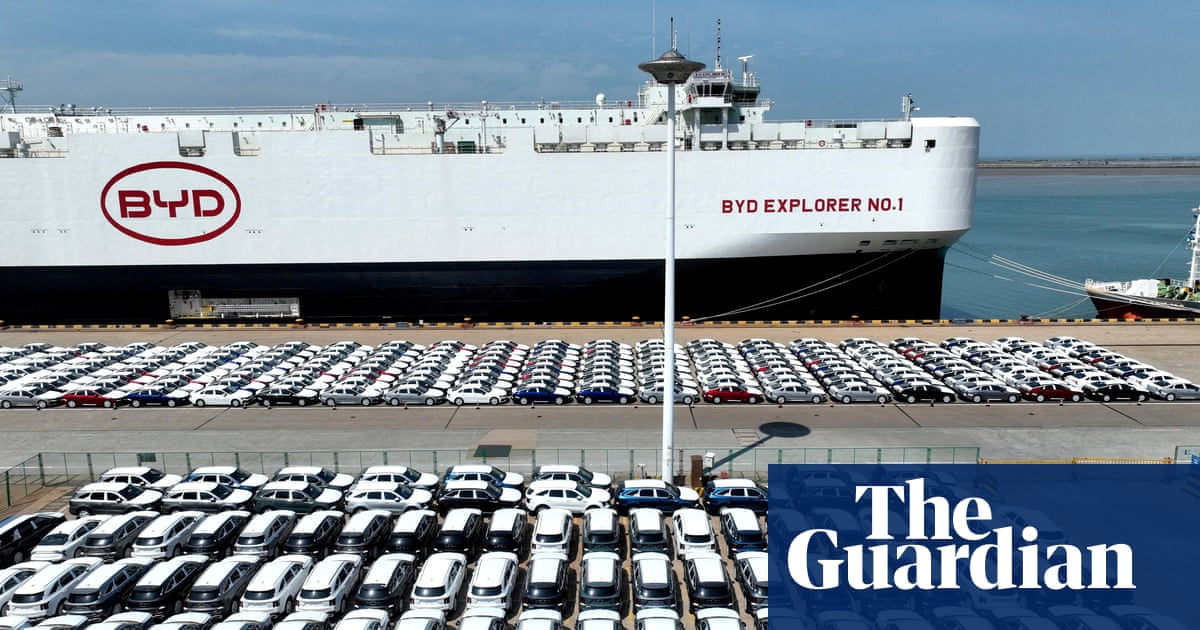The EU has notified Beijing that it intends to impose tariffs of up to 38% on imports of Chinese electric vehicles, triggering duties of more than €2bn (£1.7bn) a year and a potential trade war with China.
The tariffs will be applied provisionally from next month in line with World Trade Organization rules, which give China four weeks to challenge any evidence the EU provides to justify the levies on imported EVs.
The move follows a nine-month investigation into alleged unfair state subsidies into Chinese battery electric vehicles (BEVs) including top brands such as BYD and Geely, which part owns the Swedish brand Polestar, and Shanghai’s SAIC, which owns the British brand MG.
“The provisional findings of the EU anti-subsidy investigation indicate that the entire BEV value chain benefits heavily from unfair subsidies in China, and that the influx of subsidised Chinese imports at artificially low prices therefore presents a threat of clearly foreseeable and imminent injury to EU industry,” the EU said in a statement.
Under the plan, the EU will apply five levels of tariffs. EV manufacturers that cooperated with Brussels investigators will face a tariff of 21%, while those who did not will be hit with the top tier of 38.1%.
SAIC faces the top tariff, Geely faces a tariff of 20%, while a 17.4% duty will be applied to BYD brands, which include the Dolphin and Seal cars launched in the EU last year.
It is understood that Tesla cooperated with the EU and may initially face the 21% tariff. The EU indicated this could be revised next month to its own individually calculated duty rate after assessing evidence submitted by the US company.
The EU vice-president Margaritis Schinas said the provisional results of the investigation showed the car production in China benefited from “unfair subsidisation, which is causing a threat of economic injury to EU battery electric vehicles producers”.
He added that the EU had “reached out the Chinese authorities to discuss these findings and possible ways to resolve the issue”.
European manufacturers are also bracing themselves for a hit from retaliatory measures, with the value of all EU vehicles exported valued at close to €200bn in 2023 making China the bloc’s third most important market by share (10%) after the US and the UK. The EU is fully expecting China to also impose counter duties on a range of its exports, from French cognac to dairy products.
But insiders say the question of overcapacity of China’s car manufacturers is now becoming a domestic issue in many economies around the world. Chinese-made electric car sales, including foreign brands such as Tesla, accounted for 21.7% of the EU market in 2023 a massive leap from the 2.9% in 2020.
In December last year the European Commission president, Ursula von der Leyen, tried to persuade China that access to the world’s largest open economy was conditional on a level playing field, arguing that China could not just dump the surplus of products in the bloc.
The EU charges non-EU car manufacturers a 10% levy on imports and tariffs. . While the EU argues that Chinese manufacturers can easily absorb the increased levies, they are bracing themselves for a testing trade war with Beijing.
The assumption is that China’s president, Xi Jinping, will see it as a battle of strength which he must win as green tech is one of the few sectors in which the country’s economy is growing.
However, senior sources say that the question of EV dumping is also causing concern in non-EU member states and there is a determination to ensure that China cannot have global dominance in electric cars and other green tech products.
after newsletter promotion
The subject is expected to come up at the G7 summit in Italy on Thursday with the EU hoping to persuade other leaders that the response to China’s overcapacity in cars, steel and other items including solar panels and electric vehicle batteries needs to be “targeted”.
Sources point to Joe Biden’s recent decision to slap 100% tariffs on Chinese EV imports and argue that all partners in the G7 should not take unilateral measures that would damage another partner in the group. Turkey has also announced tariffs on Chinese EVs of 40%.
There are fears that the raising of tariffs in the US will have a knock-on effect in Europe, with China pivoting even more exports to the EU.
According to those familiar with the subject, there are also worries among G7 members that overcapacity of Chinese production could hit emerging economies such as Brazil, Mexico and India.
Leaders gathering at the G7 are expected to raise the topic of small Chinese banks funding deals with Russia amid concern this is bolstering the Kremlin’s war effort.
A spokesperson for the Chinese foreign ministry said on Wednesday that the prospect of tariffs was “protectionism”.
Lin Jian told a press briefing in Beijing that politicians and industry representatives from many European countries had expressed opposition to Brussels on the matter of tariffs, in what could be a reference to Germany, which is concerned about counter-measures on its own car exports to China.
“Protectionism has no future, and openness and cooperation are the right way, Lin said.

